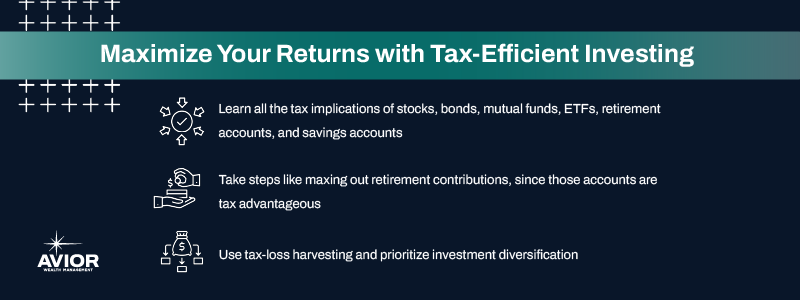Maximize Your Returns with Tax-Efficient Investing
Tax implications play a big role in the investment decisions you make. How can you maximize your returns with better tax strategies?

Tax-efficient investing concerns managing investments to minimize the impact of taxes on investment growth. The goal is to optimize after-tax returns by strategically choosing investments, considering tax implications, and employing tax-efficient strategies.
This kind of investment mindset is crucial in financial planning and can significantly affect your overall wealth preservation. You can retain a larger portion of your profits, which helps you grow assets for retirement and other financial goals.
This guide discusses common investments and their tax implications, as well as six strategies for lowering your tax burden and creating a more tax-efficient investing strategy.
Tax implications of different investment types
As you’re planning out your investment portfolio, it’s important to understand all the different investment vehicles available to you and how they each provide tax benefits or disadvantages. Let’s walk through the tax treatment of common types of investments:
- Stocks: You can bring in profit from stocks when you sell. However, these profits are subject to capital gains tax. Short-term capital gains – for those you held for less than a year – are taxed under your standard income tax rate. If you hold a stock for more than a year, you could see a lower rate of 0%, 15%, or 20%. In addition, any dividends you earn from stocks are taxed. Qualified dividends can be at a lower tax rate, but non qualified are taxed at your income tax rate.
- Mutual funds: With mutual funds, you’ll receive capital gains when the fund manager sells securities for a profit. These gains are taxed, even if the manager reinvests distributions. You also may receive taxable dividends from mutual funds, just like stocks.
- Bonds: The interest you earn from bonds is typically taxable at your income tax rate. Certain bonds, such as municipal, could supply tax-free interest income. You also need to factor in capital gains and losses with bonds.
- ETFs: Exchange-traded funds can provide a few alternative benefits, primarily that you may have fewer taxable events with these accounts when compared to the mutual fund process. You also may be able to get tax benefits for capital gains with ETFs.
- Retirement accounts: Accounts such as 401(k)s and IRAs give you additional tax benefits for your investments. With traditional accounts, tax is deferred, so you save pre-tax dollars and don’t have to worry about taxes right now. With Roth accounts, you pay taxes on your contributions now, but your investments grow tax-free, and your withdrawals in retirement aren’t taxed.
- Savings accounts: A savings account that earns interest can be an important part of your portfolio, giving you a low-risk, liquid option for savings. However, remember that any interest or dividends earned on these accounts are treated as normal income and will be taxed as such.
Understanding how investments are taxed helps you plan. Next, we’ll walk through a few tax-efficient investment strategies and tips for effective asset allocation.
Strategies for tax-efficient asset allocation
Allocating your assets more effectively will help ensure you’re taking tax-efficient steps to protect your investments. Consider these six strategies to increase your investment profits:
1. Max out retirement investments
The tax benefits of retirement accounts will help you immensely when you’re saving for the future. If you can, max out contributions to get the most benefits. If your employer offers an employer match, you’ll multiply your retirement savings even more.
Here are the 2024 contribution limits: For IRAs, you can contribute up to $7,000 per year, or $8,000 if you’re 50 or older. For 401(k)s and 403(b)s, you can contribute up to $23,000 annually, or add an extra $7,500 catch-up contribution if you’re 50 or older.
2. Leverage tax-loss harvesting
Consider tax-loss harvesting, which helps you lower your tax burden. If you sell stocks at a loss, you can use those losses to offset capital gains, reducing your overall tax liability. So, consider selling investments that are down.
3. Prioritize diversification
Diversifying your assets helps you reduce your tax liability over time. This tactic involves spreading out your investments over different types and classes. For example, instead of only investing in stocks, which can be riskier and bring big tax bills, you also invest in conservative options to even things out.
4. Hold onto investments longer
Pay attention to how long you’re holding investments as well. As mentioned above, you can lower your capital gains tax rate if you wait over a year to sell. The capital gains tax rate is often lower than your tax bracket rate.
5. Leverage 0% capital gains
If you have a low-income year, you could decide to sell investments and get 0% capital gains tax. If your income is $47,025 or below, or up to $94,050 for joint filers, your gains would fall under that 0% percent category.
6. Regularly review and adjust
Your investment strategies should be continually reviewed and adjusted to ensure you’re saving the most tax possible. As tax laws shift, your personal goals change, or your family situation changes, look at how your investments are allocated and uncover areas where you can diversify or take advantage of tax breaks.
Maximize your returns with tax-efficient investing
Any investor’s goal is to maximize growth while limiting the tax they have to pay. By examining all your investment options and their tax treatment, as well as taking advantage of tax-efficient strategies, you’ll be on your way to long-term wealth preservation and growth.
Working with a financial advisor helps you stay on track for success. They can explain any tax laws and amendments you need to know and guide you through tax-efficient strategies for better overall investing.
The team at Avior is here to assist you with investment, retirement, estate, and wealth preservation planning. Work with our team today to harness tax-efficient asset allocation strategies.
Disclaimer: Nothing contained herein should be construed as legal or tax advice. Avior and our Advisors will work with your attorney and/or tax professional to assist with your legal and tax strategies. Please consult your attorney or tax professional with specific legal and/or tax questions. Investment Management and Financial Planner are offered through Avior Wealth Management, LLC, an SEC-registered investment advisor. Past performance is not a guarantee of future results. Investments are subject to loss, including the loss of principal.
No Comments
Sorry, the comment form is closed at this time.




